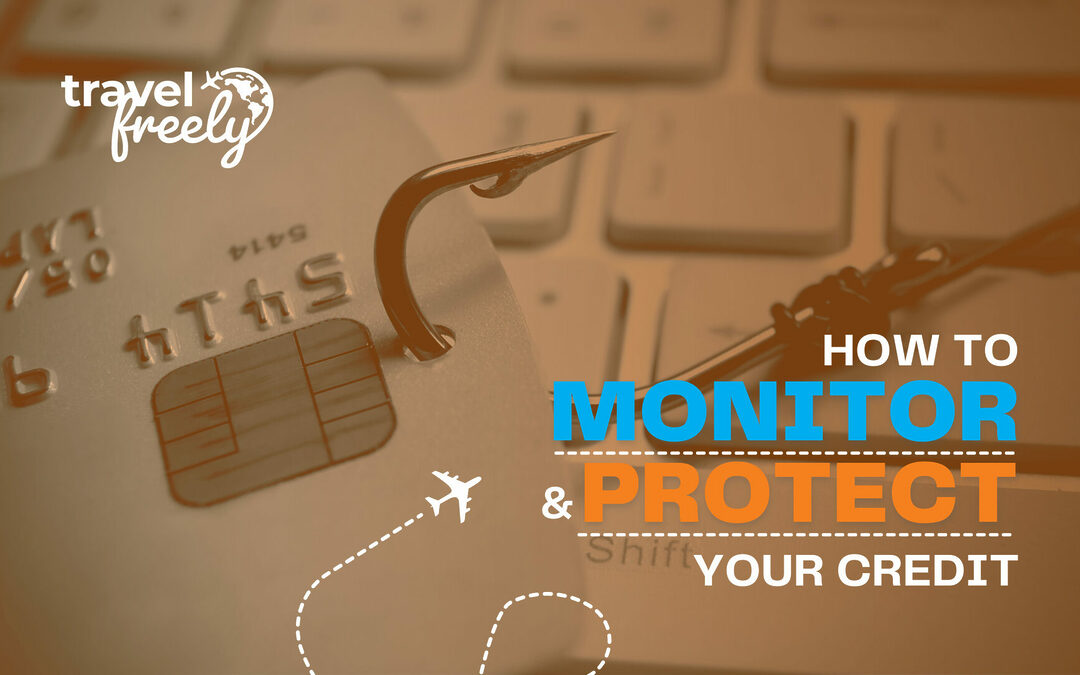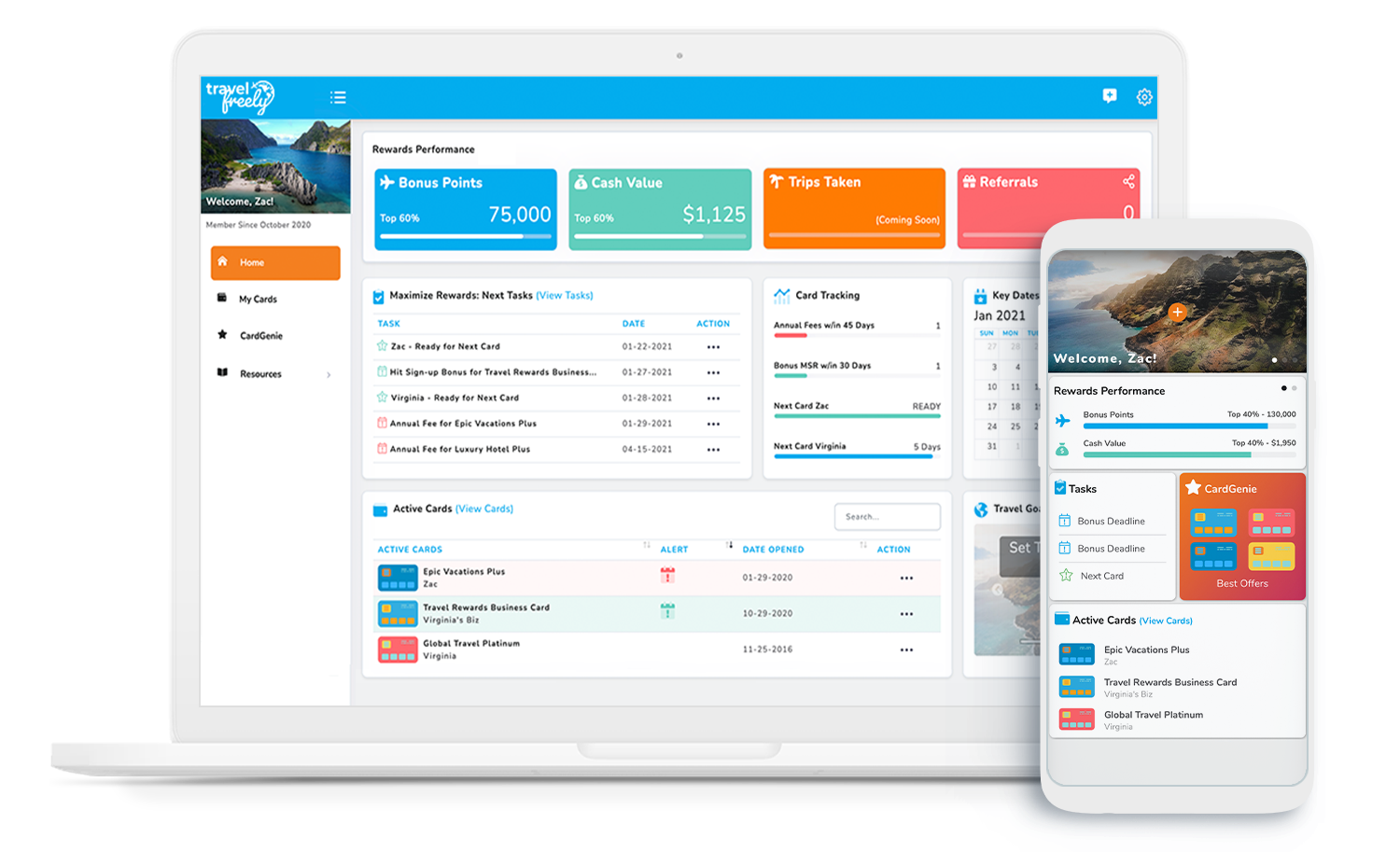We all know what let’s us Travel Freely: credit cards! That means keeping your credit in tip-top shape is imperative to help you earn more free travel. The only way to do this is if you monitor and protect your credit.
Let’s explore what steps you should be taking to monitor and protect your credit.
Monitoring and Protecting Your Credit Score Requires Access to Your Credit Report

The first step you should take when trying to monitor and protect your credit score is to get your free credit report.
There are some great places where you can get access to your credit report. You can use Credit Karma, Experian’s free credit score service, or your annual free credit report.
Remember, this is for monitoring your information. Credit Karma uses VantageScore to calculate your credit score. This is different from FICO, which is what most lenders use. Experian does give you your FICO score, which will be the same score that lenders will use when evaluating your applications.
Because of this, I’d recommend using Experian for tracking your credit score. However, Experian doesn’t give you details about your accounts. Having account information is pretty valuable when trying to monitor and protect your credit score. That’s where Credit Karma excels. Using both will maximize your ability to monitor and protect your credit score.
In summary, use them both in the following situations:
Experian: Getting your credit score.
Credit Karma: Monitoring the information that is in your credit report.
What to Look For on Your Credit Report

When you’re trying to monitor and protect your credit score, it is important to know what you’re looking for to help identify possible red flags. Keep in mind these red flags may not be mistakes. Instead, they may be a signal to dig a little bit deeper.
Review your personal information. Take notes of any incorrect addresses or incorrect employment information.
For Credit Karma users, this is easy to access. From the home page, simply click on your TransUnion or Equifax account. You’ll be shown two tabs, one is credit factors the other is credit report. You’ll find your personal information under credit report.
Check your credit accounts for discrepancies
Beneath your personal information, you’ll find lists of your various accounts. Check for any accounts that don’t seem familiar. Be aware authorized user accounts may show up here as well. So if you see an account that isn’t familiar, dig a bit deeper and it might end up being an authorized user account. Your accounts are directly beneath your personal information in Credit Karma.
Check your credit inquiries
Your credit inquiries can reveal a lot about potential fraud. It is easy to notice if someone has gained access to one of your accounts and spent thousands of dollars, but unfortunately credit fraud isn’t always so obvious. Check your credit inquiries for any suspicious inquiries that you may not be aware about. For your credit card accounts, you can cross-reference with your Travel Freely data so that way you can line up inquiries with account openings.
Review your report for collections and public records
Collections and public records (such as lawsuits, bankruptcies, or tax liens) are often overlooked by people trying to monitor and protect their credit. This section can also be found in Credit Karma. When you’re on the same “credit report” tab as earlier, scroll down past your accounts and inquiries and you’ll find the information.
Any one of these sections can contain red flags that you may want to dig deeper into. Follow up on anything you’re uncertain about. Being vigilant is important when trying to monitor and protect your credit.
What To Do If You Find Something Wrong

First, it is important to understand what something wrong is. Of course, the obvious are inquiries that you didn’t make or accounts opened in your name by someone else that weren’t authorized. But there are other types of incorrect credit information such as outdated information, missing information, or sometimes even wrong information.
Imagine if an account was reported as being opened in 2010 instead of 2001, you are missing out on the benefit of 9 years of credit history. You will want to fix these mistakes.
If you find something wrong, you should dispute it with the credit agency. There are 3 major credit agencies, and they all allow you to initiate a dispute online. If you find an error on one, there is a good chance it will appear on another report as well.
Before you file your dispute, collect supporting documents. Common errors include name changes. Providing a copy of a marriage certificate or any other proof of name change can be all that you need.
Filing disputes is another place where Credit Karma shines. You can directly dispute an error on your TransUnion or Equifax accounts from Credit Karma.
Preventative Steps You Can Use to Protect Your Credit

You don’t have to wait for something to go wrong with your credit before taking steps to protect your credit. Being proactive is one of the best ways to keep your credit score in great shape.
One of the biggest ways you can protect your credit is by freezing your credit. When you freeze your credit, it prevents anybody from accessing your credit report. Anyone trying to open an account in your name will instantly be denied due to a frozen credit report (and it will not count as a hard pull on your credit report). When you freeze your credit you get a PIN or password that you can use to unfreeze your credit.
There are some exceptions to who can see your credit. Any business that you have an existing relationship with can still access your credit report, they just cannot extend any credit while your report is still frozen. This means no new accounts can be opened, even though they can see the information. If you want to freeze your credit, be sure to open a Credit Karma and Experian account first. This will establish an existing relationship so they will still be able to update your information.
If you want to freeze your credit, you should know it takes up to 24 hours for a freeze to kick in. When you unfreeze it, the credit agencies have only 1 hour to unfreeze it. While it makes for a slight headache to unfreeze and refreeze it when you’re applying for new cards, the added security may be worth it to you.
You can freeze your credit with each of the major credit agencies at the following links:
Another proactive way to monitor your credit is to opt-in to email notifications from Credit Karma. They will send you emails when big changes occur. They aren’t always 100% correct. I recently received a notification that I had been added as an authorized user to an account when really it was a new card that I opened. However, it was quick and easy to identify what was happening.




